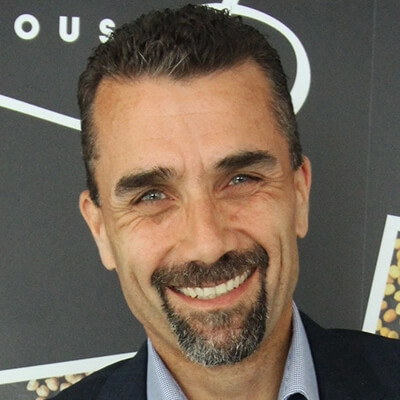How the Aviation Sustainability Forum is collaborating for change
This is a special feature from PAX International's 2022 WTCE Hamburg edition, on page 40.

Matt Crane, former CEO at Monty’s Bakehouse and now Group Head –
Food Solutions Global Innovation Center SATS and Co-Founder of the Aviation Sustainability Forum
Airline cabin waste costs more than money – it affects the environment and the passenger perception of the commercial aviation industry.
IATA says there are two forms of cabin waste: catering (galley) waste and cleaning waste. According to the IATA Cabin Waste Handbook published in 2019, the airline industry produced up to 5.7 million tonnes of cabin waste in 2017, costing the sector US$927 million. The report says these numbers have potential to double in the next 10 years.
But not if the Aviation Sustainability Forum (ASF) can help it.
Founded in 2019 by Matt Crane, former CEO at Monty’s Bakehouse and now Group Head – Food Solutions Global Innovation Center at SATS; Mike Pooley, formerly at gategroup; and Sarah Klatt-Walsh, previously at SWISS, British Airways and now Sustainability Lead at FORMIA, the Forum aims to solve sustainability through industry-wide collaboration. The ASF is an independent membership organization that operates as a not-for-profit.
“Sustainability was being used onboard to improve passenger perception but very little was being recovered or recycled. We had a big problem. We quickly realized that no one organization, aviation association, or governing body was going to solve the problem – it is simply too big and too complex. Everyone across the inflight supply chain has a role to play,” Crane tells PAX International in early-May. “To solve the problem of waste going to incineration or being buried in the ground ever year, we had to stop sustainability from being used for competitive advantage and work together to solve the problem through collaborative advantage.”
Crane says the Forum has “strong support” from IATA and the International Flight Services Association (IFSA) and is fostering relationships with the Airports Council International (ACI), the Airline Catering Association (ACA) and the International Aviation Waste Management Association (IAWMA). Its growing membership base consists of airlines, caterers, suppliers, airports, member associations and governing bodies.
Zooming out
The Forum does not represent one group in the inflight product and services supply chain, but rather aims to bring all groups together to share knowledge, best practices, ideas and problems with the aim of developing standards and solutions that can be adopted by the entire commercial aviation sector. By working together and standardizing materials used onboard, the Forum can present the case required for legislative change that will bring recovery, recycling and circularity to the international industry, thereby improving aviation’s global “environmental record,” Crane says.
Many airlines and caterers are already working on their own sustainability plans, but often the work is narrowed down to working within their own sphere of influence. The benefit of participating with the ASF is its global, industry-wide representation. And the Forum plans to openly share its findings for all to adopt, Crane explains.
“Standardization of materials and regulatory change will help all of us by ensuring clarity and consistency around the world. It will ultimately help the planet which is our main goal,” he says, adding that, “at the ASF we really believe that we can only solve this complex and extensive challenge by coming together in the true spirit of collaboration. We’re all in the same serious predicament when it comes to climate change, and we can only make a real difference if we are all pulling together and no one is left behind.”

First Forum project
Split into two parts, the ASF’s first project focuses on the environmental use case for rotable versus disposable serviceware and the options for material standardization. The report for the first phase is available for download on the ASF website, published in December 2021.
The first phase consisted of research conducted with a US-based partner and global consulting and technology services company ICF International. Through research and interviews with ASF collaborators and aviation governing bodies, ICF mapped the end-to-end cabin waste supply chain journey from source to disposal in Economy and Premium Economy cabin services. The research highlights the challenges for regulators and those seeking regulation change.
Phase two will include a detailed research and analysis program to identify a set of standard disposable F&B materials to be used by all inflight supply chain stakeholders. The materials will be sustainable and through proven waste disposal assessment, they will present no biohazard risk and negate the requirement for incineration or landfill, Crane explains.
On February 9, the ASF hosted a global webcast to update collaborators and educate interested parties on the group’s activities. Crane says the attendance was huge and a reminder that its work is “essential, valued and in need of acceleration.”
Since then, the Forum has continued to lobby for engagement to achieve the goals of the second phase.
Success for ASF
Crane says success for the Forum comes in two forms. First, the ability to fund and continue its work based on demonstrating its value on a project-by-project basis to its members and aviation sector at large. And second, that it eventually makes itself redundant by ensuring the inflight product and service supply chain is optimized for upstream and downstream sustainability and a minimal environmental impact.
ASF has four goals:
- To create a place where stakeholders from across the inflight product and services supply chain can come together and collaborate openly by sharing information, data and best practice; identify options and pathways for solving problems
- To commission independent research studies and conduct analyses to understand the problems to be solved and identify solutions. Wherever possible, studies are conducted across and within ASF members organizations as well as at or by recognized environmental research institutes
- To use the output of the ASF studies to identify standard solutions and materials to be used onboard by the entire aviation sector which improve recycling and disposal outcomes
- To use the members’ information, experience, combined influence and the solutions the ASF membership identify to support our sectors governing bodies to successfully lobby for regulatory change across the globe and ensure recovery, recycling and circularity can be optimized
The Forum is looking for people to join its Executive Board and Working Groups.
Crane encourages interested parties to visit the ASF at Booth 1G64 at WTCE or contact info@aviationsustainabilityforum.com. One hundred percent of the membership fee goes to funding the work of the ASF.

